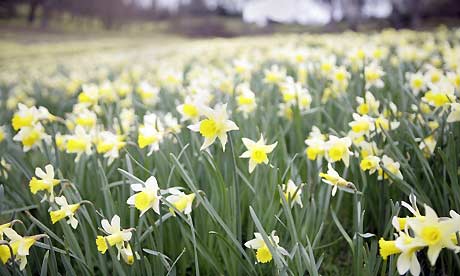Global warming desynchronizing biological cycles in Britain
By David Adam, environment correspondent
The Guardian, Tuesday 9 February 2010 As snow flurries continued to cause disruption across the country today, spring may feel further away than ever. But recent winters have been ending earlier than ever before, according to a new assessment of Britain’s wildlife that reveals global warming could be disrupting the delicate balance of nature. The analysis confirms that spring and summer are occurring earlier, but also shows that this trend appears to be accelerating. The shift could pose problems for animals, birds and fish that rely on springtime flowering of plants to supply food for their young. Stephen Thackeray, a biologist at the Centre for Ecology and Hydrology in Lancaster, who co-led the research said: “This is about the desynchronisation of events during the year. Animals and birds time their reproduction to coincide with periods when there will be an abundance of food. If changes mean there is not enough food available then this could have negative consequences for their offspring.” The new study compiled 25,000 records of springtime trends for 726 species of plants, animals, plankton, insects, amphibians, birds and fish across land, sea and freshwater habitats. It analysed them for changes in the timing of lifecycle events, such as egg laying, first flights and flowering, a science known as phenology. The results showed that more than 80% of trends between 1976 and 2005 indicated earlier seasonal events. On average, the study showed the seasonal timing of reproduction and population growth shifted forward by eleven days over the period, and that the change has accelerated recently. Thackeray said: “This is the first time that data have been analysed with enough consistency to allow a meaningful comparison of patterns of changing seasonal timing in the UK among such a diverse range of plants and animals.” …
Earlier springs could destroy delicate balance of UK wildlife, study shows
